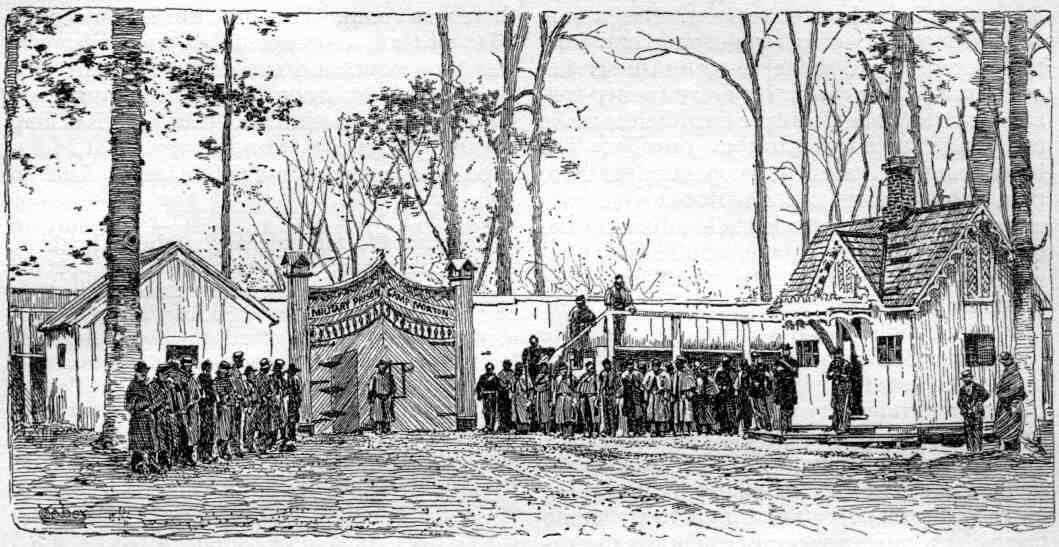TREATMENT OF PRISONERS AT CAMP MORTON
I. A REPLY TO "COLD CHEER AT CAMP MORTON"
HEADQUARTERS, DEPARTMENT OF INDIANA, GRAND ARMY OF THE REPUBLIC,
INDIANAPOLIS, June 13, 1891.
Grand Army of the Republic, at its last session at Indianapolis, April 10, 1891, to investigate the statements
contained in an article entitled " Cold Cheer at Camp Morton," written by John A. Wyeth, and printed
in the April number of THE CENTURY MAGAZINE, have examined the evidence contained in a reply to said
article, written by W. R. Holloway, entitled "Treatment of Prisoners at Camp Morton." Most of the wit-
nesses quoted by Mr. Holloway are personally known to us, and the remainder are men of high character,
who enjoy the confidence of the communities in which they reside. We therefore indorse and approve the
article written by W. R. Holloway, entitled " Treatment of Prisoners at Camp Morton."
JOHN COBURN,
M. D. MANSON,
E. H. WILLIAMS.
JAMES L. MITCHELL,
OFFICE OF DEPARTMENT COMMANDER, INDIANAPOLIS, June 10, 1891.
Grand Army of the Republic, to investigate the charges made against the official management at Camp Morton
in the treatment of prisoners of war confined therein during the years 1862 to 1865 carefully examined, in
my presence, the paper prepared by Col. W. R. Holloway in relation thereto, and verified all documents and
data referred to in said paper, and found them to be correct.

tamed an article entitled
" Cold Cheer at Camp
Morton," written by John
A. Wyeth, which charged
that the rebel prisoners
confined in Camp Morton,
him at Camp Morton. Wyeth's uncle, Cap-
tain J. M. Alien. Provost Marshal of the Fifth
District of Illinois, requested the Commissary-
General of Prisoners that the boy "be removed
to his care, or to the prison at Rock Island,
which was near his home." But he adds : "If
war were starved and subjected to other in-
human treatment or neglect. It has long been
a matter of pride to the people of Indiana that
they gave freely of their time and goods to
relieve the distresses of the half-clad and half-
famished prisoners who were sent to India-
napolis for safe keeping during the Rebellion.
They have asked no thanks for their humani-
tarian efforts, but they have the right, I think,
to claim exemption from such acts of ingrati-
tude as take a publicly defamatory form.
Mr. Wyeth's paper begins with a misstate-
ment, viz., that the writer had been guarded
after capture by a company under the com-
mand of his cousin Thomas W. Smith, of Jack-
sonville, Illinois (an officer who by the way had
resigned sixteen months before that time), and
ends with the libelous assertion that the 1763
deaths which occurred in Camp Morton were
due largely to starvation and other inhuman
treatment. If we may accept a statement made
by an uncle of Mr. Wyeth, and now preserved
in the files of the War Department, Wyeth, when
confined in Camp Morton, was "not quite
eighteen years old" and "rather delicate nat-
urally." Young Wyeth had three aunts residing
be glad to have him kept and not exchanged.
The dangers of the field service are much more
than those of the camp." If prisoners were be-
ing starved, frozen, or cruelly maltreated at
Camp Morton, it is not likely that this last re-
quest would have been made, particularly as
young Wyeth would have disclosed such treat-
ment to his aunt.
a prisoner of war, and was apparently much
surprised to find that Camp Morton was not a
hotel upholstered in modern style. With his
long catalogue of inconveniences — floorless
barracks, hard beds, lack of complete bathing
appliances with hot and cold water attach-
ments — I have nothing to do. These are the
implied incidents of war, whether in the field
or in the prison, and are not feared by those
who think they are fighting for a principle, and
should be kept in view in reading Mr. Wyeth's
article. But against his charges of starvation
and cruelty I set an explicit denial.
and abound in general assertions which are
fortified neither by names nor dates. He has
a case to plead. "The Southern side of prison



